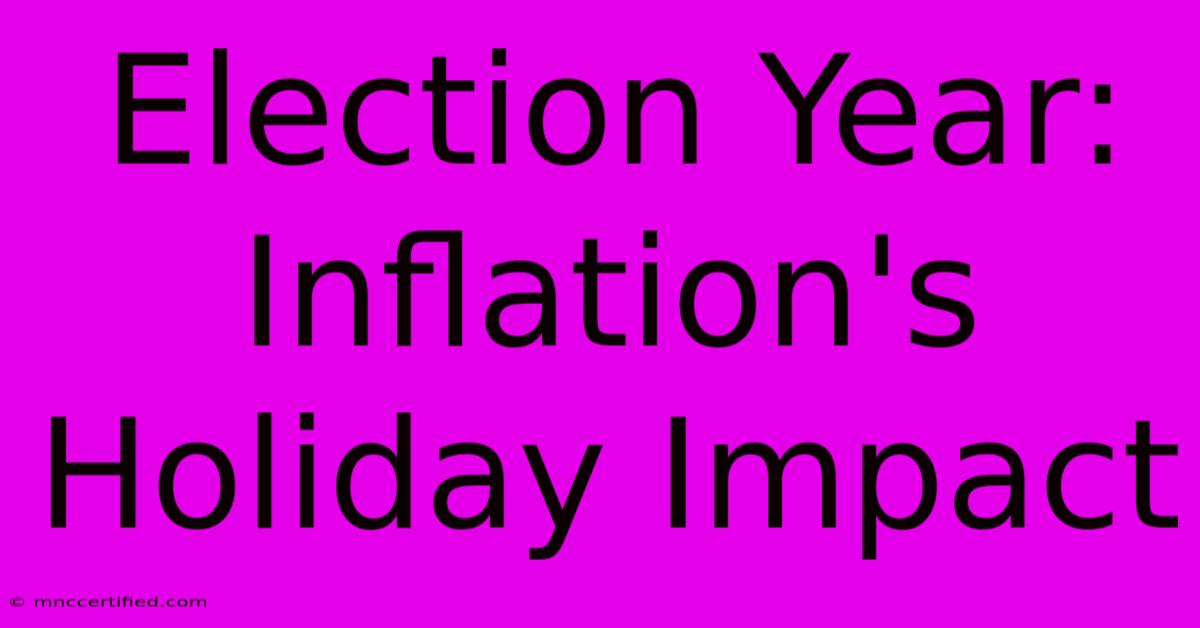Election Year: Inflation's Holiday Impact

Table of Contents
Election Year: Inflation's Holiday Impact
The holiday season is typically a time of joy, family, and gift-giving. However, in an election year, the impact of inflation casts a long shadow over festive cheer, significantly influencing consumer behavior and potentially swaying political narratives. This year is no exception. Understanding how inflation affects holiday spending and its broader political implications is crucial.
The Inflationary Squeeze on Holiday Budgets
Inflation relentlessly erodes purchasing power. This year, rising prices for essential goods like food and energy are leaving many households with less disposable income for non-essential holiday spending. This "inflationary squeeze" forces consumers to make tough choices, potentially impacting:
- Gift Buying: Consumers might opt for cheaper gifts, reduce the number of gifts purchased, or forgo gift-giving altogether. This directly affects retailers and the overall holiday economy.
- Travel Plans: Soaring fuel costs and higher airfares could limit holiday travel, impacting tourism and hospitality industries. Families may choose to celebrate closer to home, reducing spending on transportation and accommodation.
- Entertainment and Dining: The cost of dining out and attending holiday events has also increased, leading many to opt for more affordable alternatives like home-cooked meals and smaller gatherings.
How Inflation Impacts Different Demographics
The impact of inflation isn't uniform. Lower-income households are disproportionately affected, facing difficult choices between essential needs and holiday celebrations. This disparity can exacerbate existing inequalities and fuel social tensions, becoming a significant political issue. Meanwhile, higher-income households, while still feeling the pinch, have more financial flexibility to navigate the increased costs. This difference in impact can significantly influence voting patterns and political discourse.
Political Implications: Inflation as an Election Issue
Inflation is a powerful political tool. During election years, the incumbent party often faces intense scrutiny over its economic policies, particularly concerning inflation control. High inflation rates can damage public trust and negatively influence voter perceptions of the government's competence.
The Blame Game: Politicians and Inflation
Political rhetoric surrounding inflation often centers on assigning blame. The ruling party might emphasize external factors like global supply chain disruptions or geopolitical instability, while the opposition might highlight policy failures and call for alternative economic strategies. This blame game becomes a central feature of election campaigns, shaping public opinion and influencing voting choices.
Voters' Priorities: Beyond the Holiday Season
While the holiday season acutely reveals the impact of inflation, its effects extend far beyond festive spending. Concerns about inflation contribute to broader anxieties about the economy, job security, and the future. Voters increasingly prioritize economic stability and affordability when choosing their representatives.
Navigating the Holiday Season in an Inflationary Climate
Consumers can employ several strategies to navigate the holiday season during inflationary times:
- Budgeting and Prioritization: Create a detailed holiday budget and prioritize spending on what matters most.
- Smart Shopping: Compare prices, look for deals and discounts, and consider buying secondhand or making homemade gifts.
- Early Planning: Start holiday shopping early to avoid last-minute price hikes and potential shortages.
Conclusion: Inflation's Lasting Influence
The impact of inflation on the holiday season is undeniable. Its effects extend beyond mere consumer spending, influencing political discourse, shaping voting patterns, and highlighting economic inequalities. Understanding this complex interplay is crucial for both consumers navigating their holiday budgets and political analysts observing the election landscape. The holiday season, in an election year marked by inflation, serves as a microcosm reflecting broader economic anxieties and political realities.

Thank you for visiting our website wich cover about Election Year: Inflation's Holiday Impact. We hope the information provided has been useful to you. Feel free to contact us if you have any questions or need further assistance. See you next time and dont miss to bookmark.
Featured Posts
-
Rachel Reeves Economic Policy Advice
Dec 23, 2024
-
Fury Fight Tommys Miserable Appearance
Dec 23, 2024
-
Premier League Everton Vs Chelsea Tv
Dec 23, 2024
-
Browns Offense Falters Robinsons Impact
Dec 23, 2024
-
Bengals Defeat Browns Playoff Push On
Dec 23, 2024